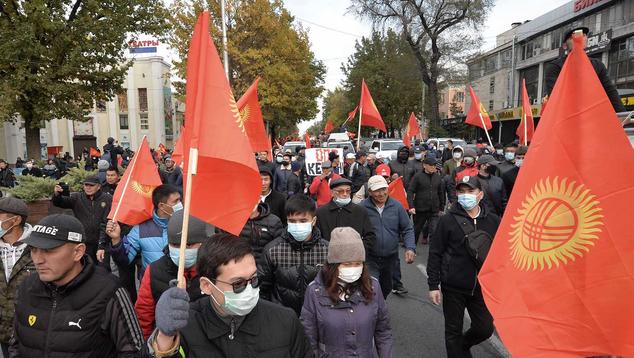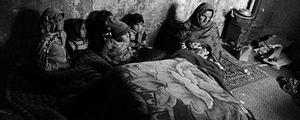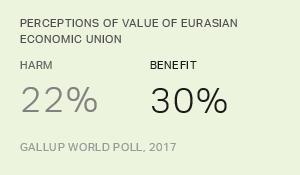Story Highlights
- Sooronbai Jeenbekov's approval dropped from 77% in 2018 to 57% in 2019
- 77% of Kyrgyzstanis said corruption was widespread in government in 2019
WASHINGTON, D.C. -- Before the recent unrest gripping Central Asia's only democracy, Kyrgyzstanis were souring on President Sooronbai Jeenbekov, who resigned Thursday in response to the protests. While the majority (57%) approved of his job performance in 2019, his approval rating had dropped 20 percentage points since his first year in office in 2018. Jeenbekov's predecessor, Almazbek Atambayev -- who has been arrested for organizing riots -- never saw ratings lower than 61%.
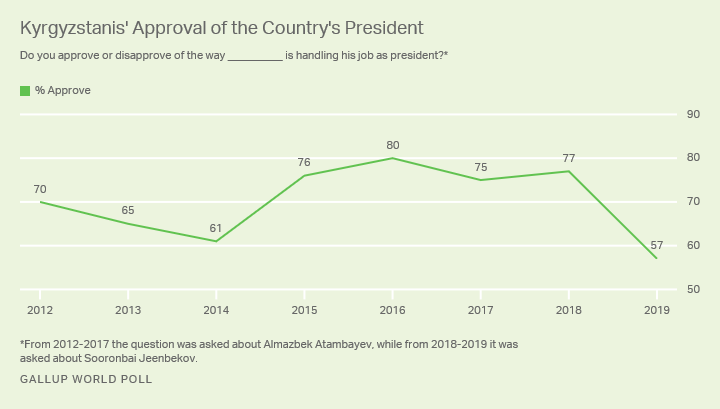
Line graph. Kyrgyzstanis' approval for former Presidents Sooronbai Jeenbekov and Almazbek Atambayev. From 2012 to 2017, approval for Atambayev never dropped below 61%, while approval of Jeenbekov fell from 77% in 2018 to 57% in 2019.
Civil unrest has rocked Kyrgyzstan since the country's recently annulled parliamentary elections on Oct. 4, which opposition parties claim were rigged. Political parties allied with Jeenbekov allegedly won the largest share of the vote, and Kyrgyzstanis' frustration with Jeenbekov and the measures he had implemented to control COVID-19 spilled out into the streets.
Kyrgyzstanis have not placed much faith in the honesty of the country's elections over the past 15 years -- during which they have ousted two previous leaders. Before the most recent parliamentary elections, 30% expressed confidence in their elections. That 30% is down from the trend-high 41% in 2016, but well above the low of 14% in 2010, after the country's 2009 presidential election that was marred by a violent crackdown by the incumbent Kurmanbek Bakiyev.
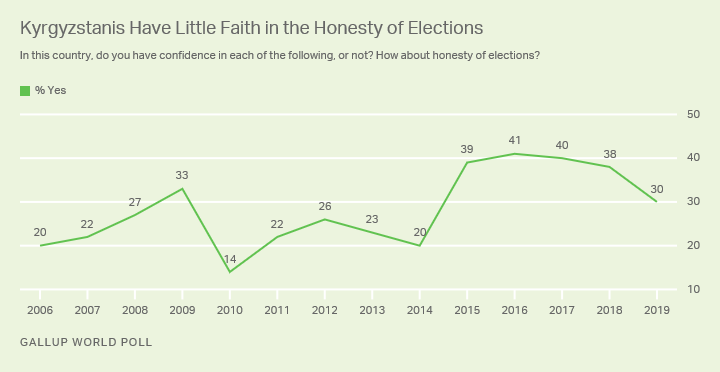
Line graph. Kyrgyzstanis' faith in the honesty of the country's elections. In 2019, 30% of Kyrgyzstanis indicated they had faith in the honesty of the country's elections, down from 38% in 2018.
Kyrgyzstanis' low faith in their elections may be at least partly related to the large percentages of the population who perceive corruption as widespread in the country's government. Three-quarters or more of Kyrgyzstanis have consistently said corruption is widespread in government throughout Gallup's trend. Kyrgyzstanis see corruption as equally pervasive in business and government, with no less than 73% saying corruption is widespread in business in Gallup's trend. These perceptions have likely been only reinforced by reports of intimidation and violence on the part of organized criminal groups during the current unrest.
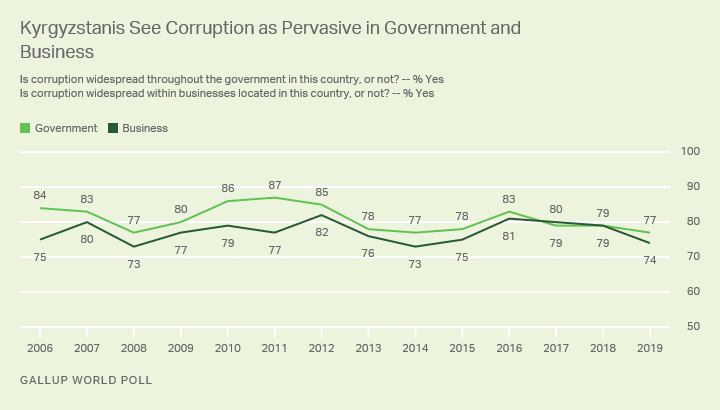
Line graph. Kyrgyzstanis' perception that corruption is widespread in government and business. 77% of Kyrgyzstanis in 2019 said corruption is widespread in government, while 74% say it is widespread in business.
Before COVID-19, Kyrgyzstanis' Situations Not Improving
Compounding Kyrgyzstan's political problems is the fact that substantial percentages of the country's population were continuing to struggle economically before the COVID-19 pandemic. In the most recent survey, from 2019, 36% of Kyrgyzstanis had been unable to afford food at times in the past 12 months and 43% reported struggling to afford shelter. Although the current figures fall short of the record highs, both measures have been elevated for the past several years.
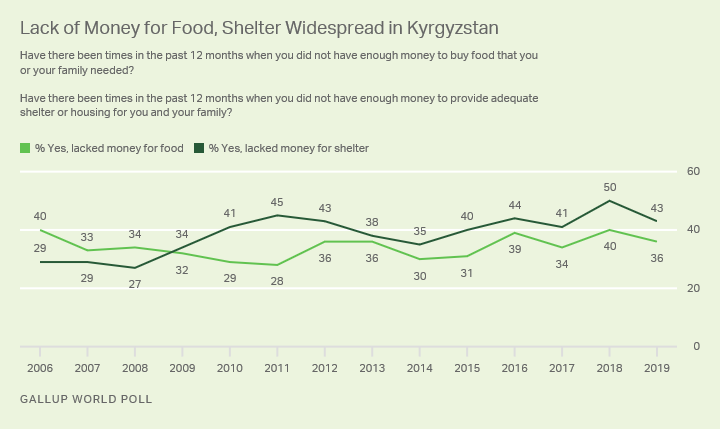
Line graph. The percentages of Kyrgyzstanis who have lacked money for food or shelter in the past 12 months. 36% of Kyrgyzstanis in 2019 have lacked money for food and 43% have lacked money for shelter.
Since Jeenbekov took office, Kyrgyzstanis' household incomes have not been heading in the right direction. Between 2017 and 2019, the percentage of Kyrgyzstanis saying they found it difficult or very difficult to get by on their household income grew modestly from 27% to 32%. At the same time, the percentage saying they were living comfortably or getting by on their household income declined from 71% to 66%.
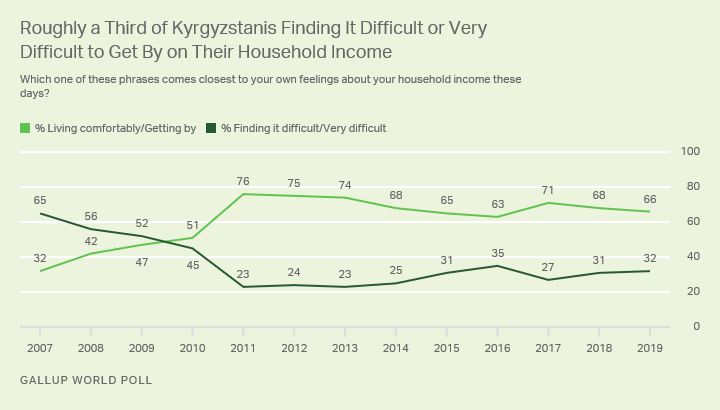
Line graph. Kyrgyzstanis' ability to get by on their current household income. 66% of Kyrgyzstanis in 2019 were living comfortably or getting by on their current household income. Alternatively, 32% of Kyrgyzstanis were finding it difficult or very difficult to get by on their current household income.
Bottom Line
Before the COVID-19 pandemic and the recent turmoil gripping their country, Kyrgyzstanis had already started to sour on Jeenbekov. It is unlikely that the unpopular measures Jeenbekov imposed to control COVID-19 -- including closing the country's borders and closing down nonessential businesses, as well as a perceived failure to provide assistance to the public -- earned him more fans.
The economic effects of the pandemic, added to perceptions that political parties allied to Jeenbekov bought votes and took other measures to influence the election, were sufficient to spark widespread protests. Protesters have rallied around Atambayev, who had been imprisoned after being convicted of corruption charges. Jeenbekov's resignation marks the third time in 15 years that popular protests have brought down a president in Kyrgyzstan.
For complete methodology and specific survey dates, please review Gallup's Country Data Set details.
Learn more about how the Gallup World Poll works.
